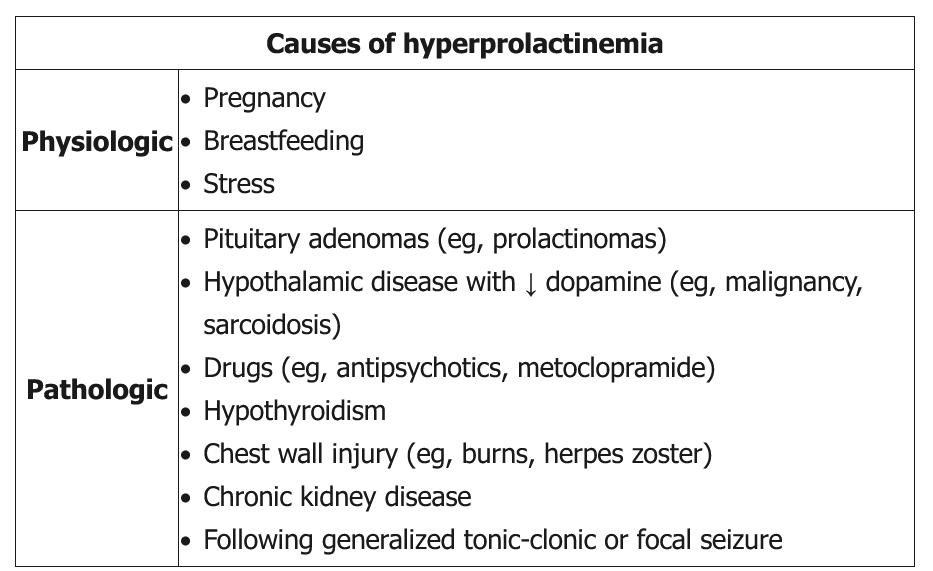hyperprolactinemia
- related: Endocrine, prolactinoma and pregnancy, prolactinoma
- tags: #endocrine

Causes of high prolactin:
-
most common cause:
- physiologic (pregnancy and lactation)
- physiologic stress, coitus, sleep, nipple stimulation
-
pathologic:
- primary hypothyroidism
- pituitary stalk compression
- medications: antipsychotics, usually 25-100 ng/mL
- metoclopramide, risperidone, phenothiazine can cause > 200ng/mL
This patient has hyperprolactinemia, most likely due to chronic kidney disease (CKD). Hyperprolactinemia is common in CKD due to a 3-fold increase in prolactin release (as a result of an altered inhibitory effect of dopamine) and a 30% decrease in prolactin clearance. Prolactin levels are usually modestly elevated (<100 ng/mL).
Prolactin levels in patients with CKD do not respond to hemodialysis but can be normalized with dopamine agonists (eg, bromocriptine, cabergoline). However, sexual dysfunction often persists due to additional contributing factors (eg, neuropathy, vascular disease, medications). Low serum testosterone levels also are common in CKD, but testosterone therapy does not improve symptoms in most patients.
Symptoms:
- amenorrhea, galactorrhea in premenopausal women
- men: mass effect, hypogonadism, gynecomastia
Management
-
Discontinue offending drug for 3 days to determine whether level normalizes
-
Antipsychotic drug needs to be discontinued in consultation with psychiatrist
-
Perform pituitary MRI if cannot discontinue drug (this means everyone on antipsychotics)
-
MRI pituitary indicated in all patients with unexplained high prolactin
-
macroprolactinoma (≥1 cm)
- prolactin > 500 ng/mL diagnostic of macroprolactinoma
- prolactin correlate with tumor size
- when macroadenoma present with prolactin < 100, cause usually from stalk compression from nonfunctioning tumor and not from prolactionoma
- dopamine agonist used as treatment
- cabergoline: preferred, more efficacious at lowering prolactin and shrink tumor. Dosed weekly
- bromocriptine: dosing qd to tid
- monitor prolactin level 2-4 wks then 3-4 months
- repeat MRI in 3 months, then every 6-12 months until stability
- surgery not first line: 50% recur after resection
- only consider surgery if cannot tolerate medication or fails medication
-
microadnoma:
- asymptomatic pts do not require treatment
- premenopausal women with hypogonadism treated with OCP if do not want children or dopamine agonist if do want children
- postmenopausal women: no treatment
- repeat MRI in 1 year